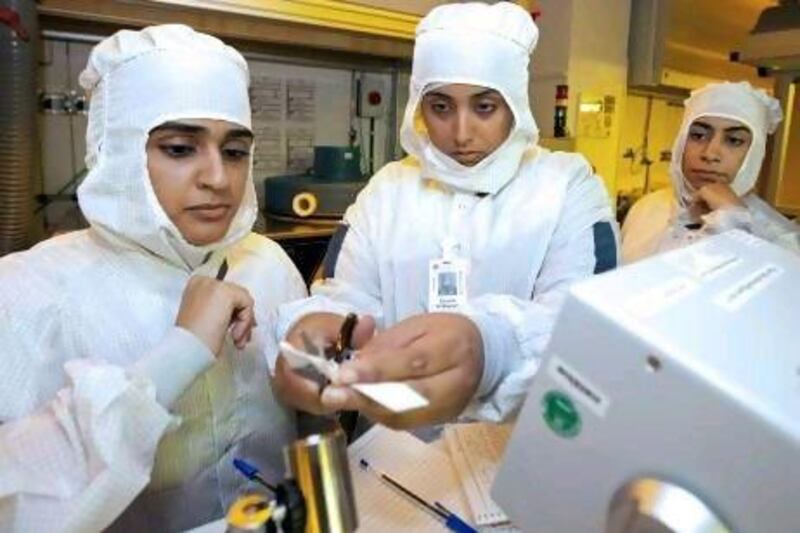ABU DHABI // Arab women studying science and technology in the region are less likely to pursue careers in those fields than males, a report has found.
The lack of female scientists and technology experts was a lost opportunity in advancing the knowledge economy, the report released yesterday by the Economist Intelligence Unit concluded.
The Advanced Technology Investment Company (Atic) in Abu Dhabi commissioned the report to better understand what role women played in the region's industry.
"The report's findings are tremendously significant in this regard, underlining female integration as a necessary element for any nation seeking to maximise returns on their human capital investment," it said.
Generally, female students perform at least as well as males in science and maths, and in many cases were outperforming them, the report said.
Year 8 girls across most of the regions countries scored consistently better than boys in maths and science.
Many females then went on to pursue higher education in their chosen subject, the report found.
In Saudi Arabia, 65 per cent of all enrolments in science in 2010 were women, compared with 47 per cent a decade earlier.
But only a small number of those graduates went on to work in science and technology.
Women accounted for only 1 per cent of researchers in Saudi Arabia, 19 per cent in Palestine and 22 per cent in Libya.
The findings raise questions about whether the UAE and other governments invest enough in encouraging more young people, including women, to pursue higher education in science and technology.
Experts interviewed for the research said the curriculum needed a sharper focus on science, technology and maths.
"In the UAE, we are not really exciting kids about science and maths, and this causing a real problem in gearing students towards those professions that are critical to this country," Abdullatif Al Shamsi, director general of the Institute of Applied Technology in the UAE, said in the report.
Only 10 per cent of new students at the Higher Colleges of Technology were adequately equipped to go straight into academic programmes, said Marshall Drummond, provost of the federal university.
Instead, 90 per cent spend one or two years on remedial foundation courses in English or maths, which up to 40 per cent do not make it through, the report said.
"It is a big drain on our efforts and it is a big drain on the institution," Mr Drummond said.
The UAE Government regards developing science and technology as an important cornerstone of its efforts to diversify the economy.
Atic, part of Mubadala Development, a strategic investment company owned by the Abu Dhabi Government, has been making huge investments in improving research and development within the capital.
It is investing US$2.4 million (Dh8.8m) in a research centre in Abu Dhabi and plans to launch a semiconductor factory in the future.
Experts said the challenge of encouraging more women into science and technology roles was similar across the region.
"If educated women cannot find suitable jobs, none of the investment in their human capital will benefit themselves or their societies to the extent it should," Savas Alpay, director general of the Statistical, Economic and Social Research and Training Centre for Islamic Countries in Turkey, said in the report.






